
The Equitable Education Fund (EEF) Thailand, in collaboration with The Mirror Foundation, the Education Management in Highland and Remote Area Network, and ALTV (Thai PBS), organized the first ‘Opportunity Bank and Teachers’ Path’ event in the northern region on 1 June 2024, at Banthirdthai School, Mae Fa Luang District, Chiang Rai Province. The event saw participation from over 200 teachers and network members from more than 30 remote schools.
The students’ learning outcomes depend on the quality of teaching provided by their teachers and the availability of school resources. ‘Investing in the Opportunity Bank is a win-win investment’ because statistical research clearly shows that “the learning outcomes of students in rural schools are two academic years behind those in urban areas.” The primary reason for this gap is the lack of quality educational materials and equipment. Computers and technological equipment are essential for learning today, yet most remote schools still lack these resources due to insufficient budgets.

In collaboration with The Mirror Foundation, the Equitable Education Fund (EEF) Thailand mobilizes social cooperation to launch the Opportunity Bank project, acting as a ‘mediator’ to receive and deliver donated items to schools in need. The first ‘Opportunity Bank and Teachers’ Path event delivered 250 computers and a team to install them in 21 schools in the northern region. Other educational resources were shared, including school uniforms, sports equipment, books promoting reading, teaching materials, and skill-enhancement tools.
Furthermore, a forum was held under the theme ‘All For Education – Education For All: Distributing Educational Resources to Remote Schools’ to advance the cooperation movement. This forum gathered proposals from various stakeholders, including school administrators, Educational Service Area representatives, Chiang Rai Province Members of Parliament, local political sectors, and local teachers. There was a consensus that while donating items through the ‘Opportunity Bank and Teachers’ Path’ can immediately alleviate urgent problems, sustainable solutions lie in budget reform and equitable resource allocation.
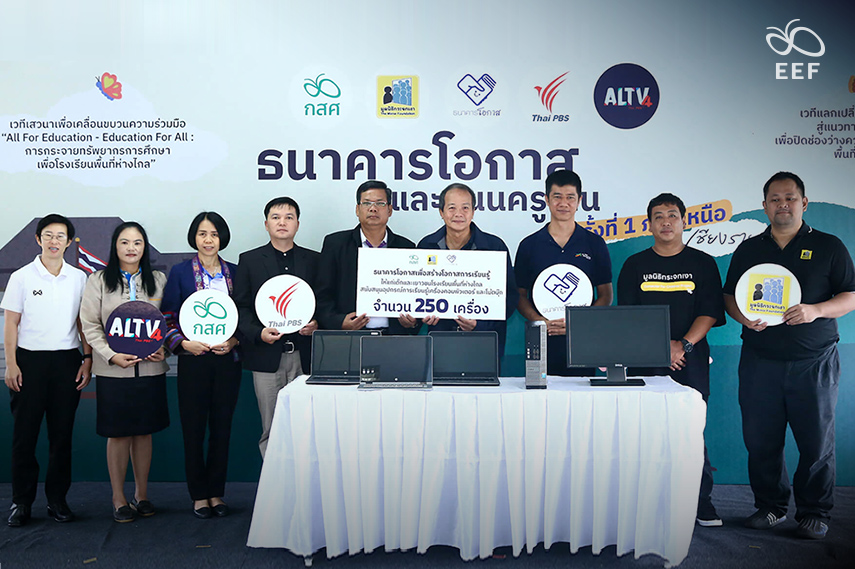
Mr. Chairat Jinarat, Deputy Director of Chiang Rai Primary Educational Service Area Office 3, stated that the ‘Opportunity Bank and Teachers’ Path event exemplifies the mission to reduce educational inequality. This initiative aligns with the Minister of Education’s policy to ‘hold hands and move forward together.’ Chiang Rai Primary Educational Service Area Office 3 oversees five districts in a special highland area, serving around 35,000 students from 139 schools. Many of these students are significantly affected by educational inequality. Therefore, he is delighted that external organizations recognize these issues and are mobilizing efforts to bring change, providing more opportunities for students in these areas.
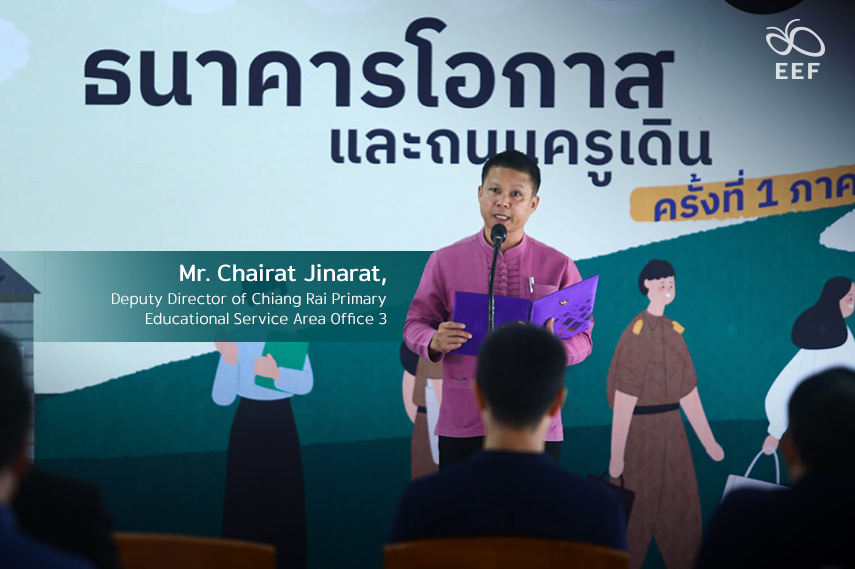
” ‘The Opportunity Bank and Teachers’ Path not only brings resources to children but also serves as a vital platform for local administrators and teachers to reflect on their work and provide necessary information to improve education management in highland areas. It also facilitates external teams, including policymakers, academics, teachers, and educational personnel, to exchange ideas and identify immediate and feasible ways to push for policy changes. Moreover, it offers a crucial opportunity for all highland schools in the northern region to coordinate their efforts as a network, working together to bridge the educational opportunity gap in remote areas and elevate their standards to match those of schools in other regions.”
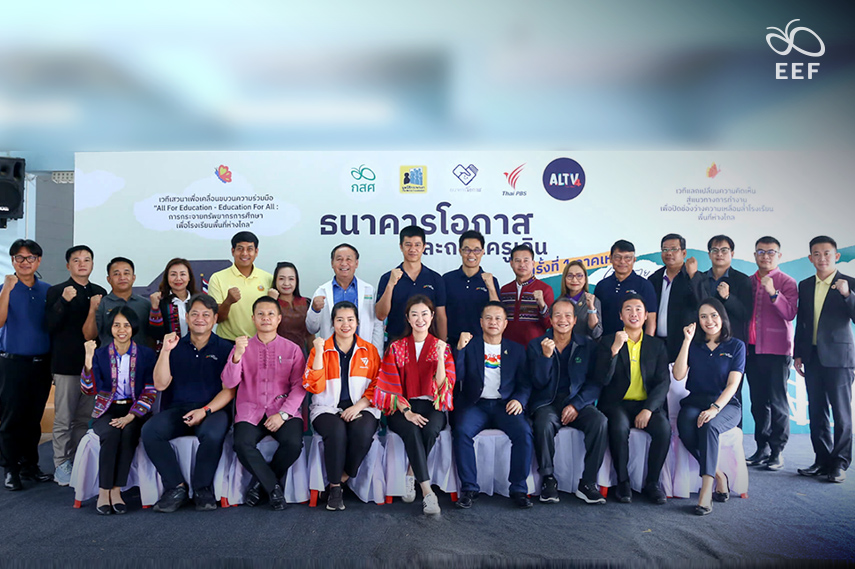
Prof. Dr. Somphong Jitradab stated that the ‘Opportunity Bank and Teachers’ Path event was organized to address the issue of educational inequality, particularly the allocation of budget from the central government, which is linked to per capita spending. This is one of the root causes of resource inequality for schools in remote areas. Many small rural schools serve as learning spaces for ethnic children, students with disabilities, and underprivileged children from families with an average monthly income of no more than 3,000 Thai baht. These issues hinder the development of educational quality and pose a risk of students dropping out of the education system. Therefore, EEF and its partners assert that proper resource allocation is crucial for implementing the government’s ‘Thailand Zero Dropout’ policy. The goal is to mobilize resources nationwide to reach underprivileged and needy areas and to support flexible, alternative, and life-relevant education. Examples include the 1 School 3 Systems initiative, which integrates formal, non-formal, and informal education, and the creation of ‘Mobile School’ innovations that facilitate learning anytime and anywhere. These initiatives align with the Credit Bank announced by the Ministry of Education.
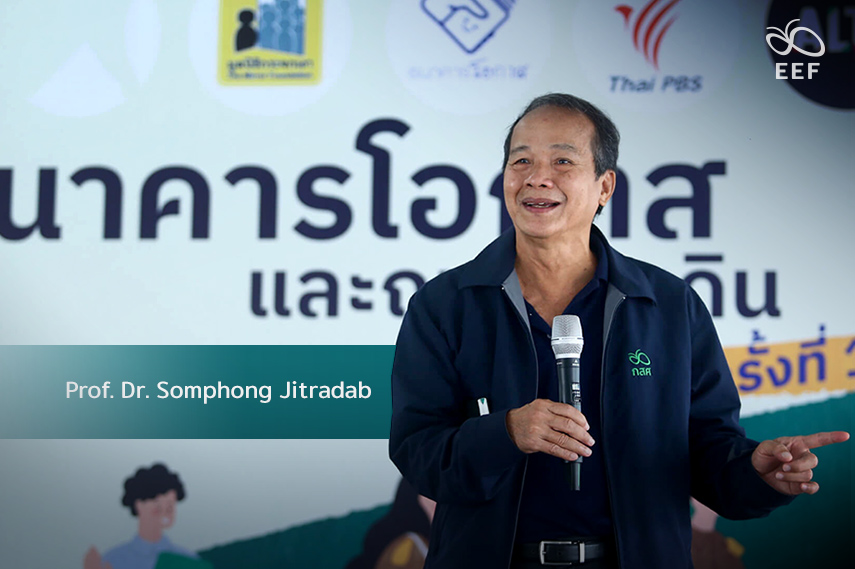
“We must not forget that each child and youth, as well as the context of each area, is unique. Therefore, relying on a single model for allocating educational resources could result in about 10% of children dropping out yearly.”
Prof. Dr. Sompong Jitradab stated that the ‘Opportunity Bank and Teachers’ Path’ represents a form of Communication for Change, highlighting the need for equitable budget and resource allocation. This initiative is driven by the collaboration of EEF’s partners, who help collect and deliver resources to areas in genuine need. Everyone involved hopes that the outcome of this activity will inspire a societal shift in mindset. The message is that developing quality education in Thailand should no longer be the state’s sole responsibility. Instead, local sectors, private and civil society organizations, communities, and individuals must take ownership of these issues and work together to overcome challenges. Change will gradually occur if this collaborative approach is followed, leading to tangible results. It will show that when resources and budgets are allocated to children and areas that truly need them, with consideration of the local context, it can lead to effective education management that aligns with the diverse characteristics of each area and the inherent potential of every child.

“EEF has discovered an effective approach, already implemented in some areas, demonstrating that collaboration between the private sector and local government organizations can address budget shortages and navigate specific regulations. Our experience shows that when a database is reliable, targeting is precise, and the approach inspires confidence, the private sector is more likely to invest resources fully. These organizations understand the importance of investing in local development. Therefore, today’s ‘Opportunity Bank and Teachers’ Path’ activity represents an initial effort where all parties collaborate to bridge the inequality gap by distributing resources. This initiative aims to engage capable and willing private sector entities, encouraging them to participate in similar collaborations in other regions.”

Mr. Thirat Plinkool, head of the Mirror Foundation’s Sharing Center, stated that the ‘Opportunity Bank and Teachers’ Path’ initiative unites various parties to collect, sort, and distribute resources across the country to remote and underprivileged areas. This initiative creates multiple opportunities. First, it supports students in remote schools by enabling them to continue their education and explore their interests and potential. Second, it offers teachers the chance to enhance their teaching methods. Lastly, it addresses broader inequalities beyond education, improving the overall quality of life for children, youth, and teachers in these remote areas.

“The Mirror Foundation believes that enabling every child and youth to reach their full potential is key to transforming the country’s development. In our fieldwork, we have observed that many teachers in remote areas demonstrate remarkable dedication and effectively utilize the limited resources available to provide quality education. However, everyone can agree that their teaching could be even more impactful with complete equipment and proper tools. Additionally, electronic devices such as computers, tablets, and smartphones serve as gateways to new perspectives for children. They allow students to search for information they are interested in at any time, especially information related to their future career aspirations.
Mr. Patanapong Sukmadan, Assistant Managing Director, Equitable Education Fund (EEF) Thailand, stated that the ‘Opportunity Bank and Teachers’ Path’ initiative is a foundational step toward improving access to opportunities and enhancing the quality of education in remote schools, making it more equitable. EEF is also engaged in several long-term development and structural change projects, including the ‘Teacher for Local Development’ Program, the ‘Teacher and School Quality’ Program (TSQP), and the ‘Out-of-School Youth Learning Enhancement’ Program. These projects collaborate with Educational Service Area Offices and schools to increase access to quality education for children and youth in remote and underserved areas.

“EEF believes that addressing the specific needs of each area and developing policy proposals for systemic change must occur simultaneously. This approach aims to bridge urgent gaps in inequality and ensure that resources and budgets are allocated appropriately based on the local context and current situations. Immediate resource mobilization is essential for improving learning management in small and remote schools. Additionally, advocating for policy changes to adjust the budget structure supporting these schools’ infrastructure is crucial to addressing their unique needs and limitations. This effort seeks to close the ‘two-year learning gap’ between remote and urban schools.”
The ‘Opportunity Bank and Teachers’ Path activities will be organized in four regions, starting with Chiang Rai province, followed by events in the southern, northeastern, and eastern regions throughout 2024.
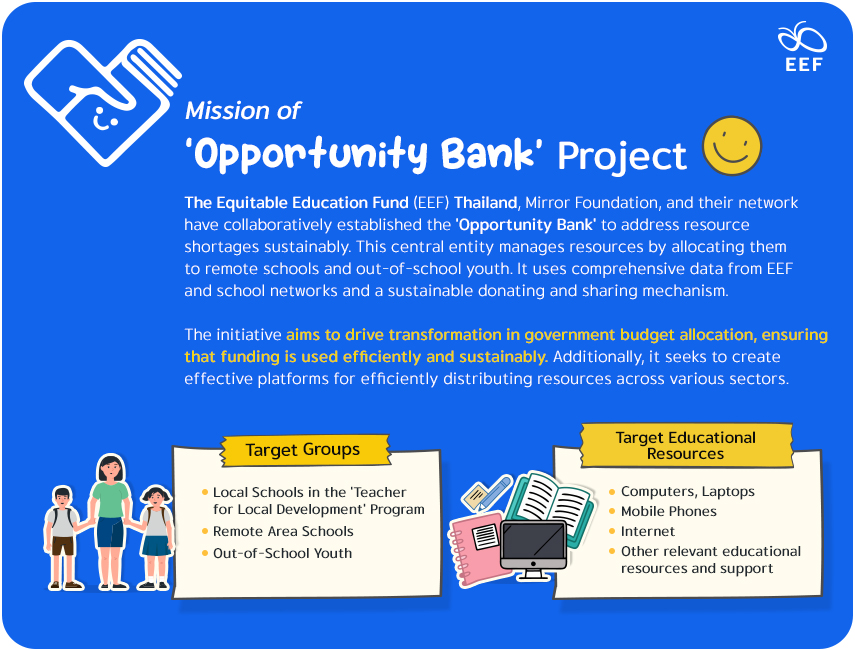
Mission of ‘Opportunity Bank’ Project
The Equitable Education Fund (EEF) Thailand, Mirror Foundation, and their network have collaboratively established the ‘Opportunity Bank’ to address resource shortages sustainably. This central entity manages resources by allocating them to remote schools and out-of-school youth. It uses comprehensive data from EEF and school networks and a sustainable donating and sharing mechanism. The initiative aims to drive transformation in government budget allocation, ensuring that funding is used efficiently and sustainably. Additionally, it seeks to create effective platforms for efficiently distributing resources across various sectors.
Target Groups / Target Educational Resources
- Target Groups
- Local Schools in the ‘Teacher for Local Development’ Program
- Remote Area Schools
- Out-of-School Youth
- Target Educational Resources
- Computers, Laptops
- Mobile Phones
- Internet
- Other relevant educational resources and support
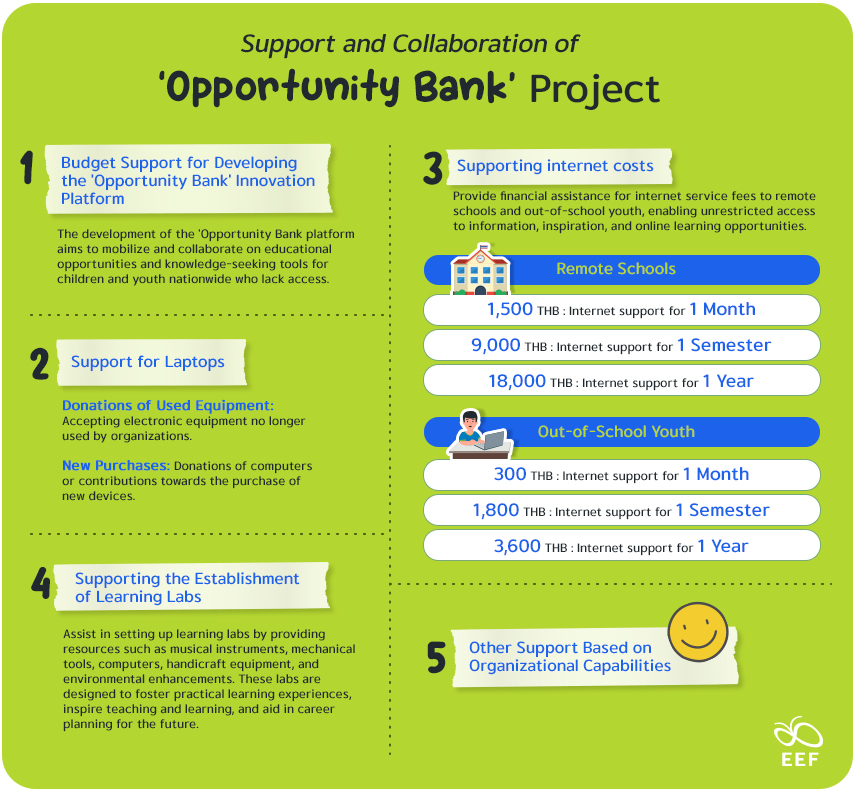
Support and Collaboration of ‘Opportunity Bank’ Project
- Budget Support for Developing the ‘Opportunity Bank’ Innovation Platform
The development of the ‘Opportunity Bank platform aims to mobilize and collaborate on educational opportunities and knowledge-seeking tools for children and youth nationwide who lack access.
- Support for Laptops
- Donations of Used Equipment: Accepting electronic equipment no longer used by organizations.
- New Purchases: Donations of computers or contributions towards the purchase of new devices.
- Supporting internet costs
Provide financial assistance for internet service fees to remote schools and out-of-school youth, enabling unrestricted access to information, inspiration, and online learning opportunities.
- Remote Schools
- 1,500 Thai baht: Internet support for 1 month
- 9,000 Thai baht: Internet support for 1 semester
- 18,000 Thai baht: Internet support for 1 year
- Out-of-School Youth
- 300 Thai baht: Internet support for 1 month
- 1,800 Thai baht: Internet support for 1 semester
- 3,600 Thai baht: Internet support for 1 year
- Supporting the Establishment of Learning Labs
Assist in setting up learning labs by providing resources such as musical instruments, mechanical tools, computers, handicraft equipment, and environmental enhancements. These labs are designed to foster practical learning experiences, inspire teaching and learning, and aid in career planning for the future.
- Other Support Based on Organizational Capabilities

